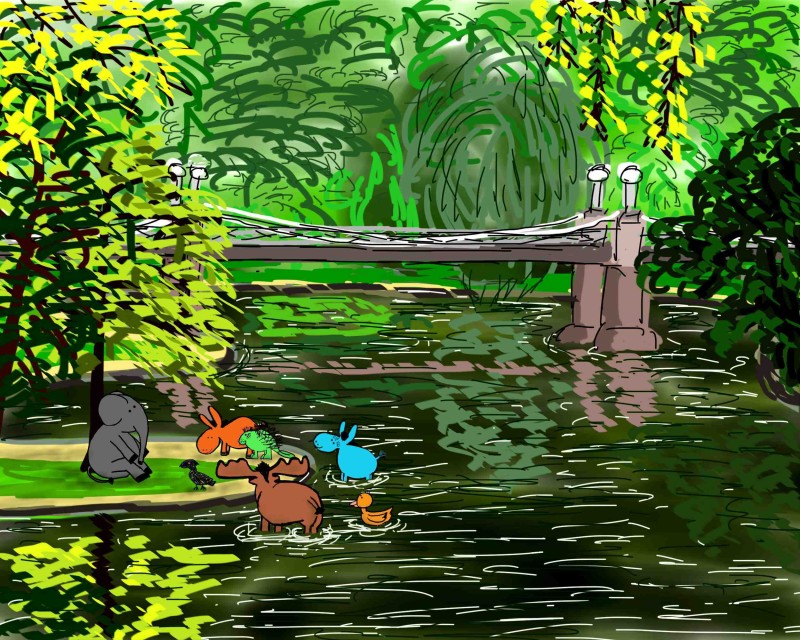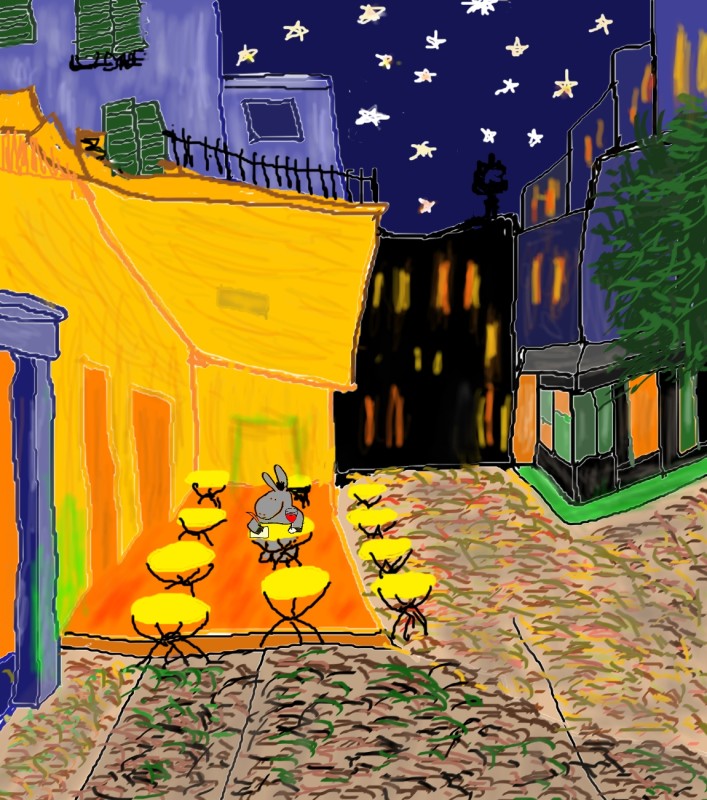Welcome, said Harlan, to “Where-101.” Today’s question is: “Where is Borneo?”
What is Borneo? said Morton.
No, said Harlan, “Where is Borneo?”
In Asia, said Glouster.
What’s he doing in Asia? said Morton.
Borneo isn’t a he, said Glouster, it’s an it.
An it? said Morton.
Yes, said Glouster, an island north of Java.
I like a cup of Java in the morning, said Frank, sometimes two.
Java is an island, said Glouster.
How do you know so much? said Chelsea.
North Borneo, said Glouster, was a protectorate of the British Empire from 1881 to 1941, and a Crown Colony from 1946 to 1963.
Do they speak English in Borneo? said Emma Lou.
The official language is Bahasa Melayu, said Glouster, but English is common, as well as the indigenous languages, Oma Lung and Uma Kulit.
Is Asia far from Boston? said Chelsea.
It’s on the other side of the world, said Glouster.
How far is that? said Chelsea.
Nine thousand two hundred and fifty-two miles, said Glouster.
Wow, said Chelsea, that would take forever!
How fast can you walk? Morton.
Four miles per hour, said Chelsea.
Really? said Morton. I only walk three.
I can fly thirty miles per hour, said Frank.
I wish I could fly, said Chelsea.
I can only walk one mile per hour, said Emma Lou.
I can fly more than forty miles per hour, said Glouster, and swim almost twice as fast.
Wow, said Chelsea, like the speed of light!
Not that fast, said Emma Lou.
Why would anyone live in Borneo, said Morton, if it’s so far from Boston?
Why would anyone live in Boston, said Emma Lou, if it’s so far from Borneo?
What does it feel like to fly? said Chelsea.
It’s like swimming, said Glouster, but in the air.
What does it feel like to swim? said Chelsea.
It’s like flying, said Glouster, but in water.
I don’t swim very fast, said Emma Lou, but I float.
Really? said Chelsea. Without sinking?
Yes, said Emma Lou.
Wow, said Chelsea.
Are there donkeys in Borneo? said Morton.
A few, said Glouster, but there are more elephants.
How many more? said Morton.
Fewer than there were, said Glouster, before their habitat was destroyed.
Is that why you left Borneo? said Emma Lou.
Yes, said Harlan.
That’s very sad, said Chelsea.
Does your family still live there? said Emma Lou.
My brothers, said Harlan, were killed for their tusks.
What?! said Chelsea.
And I don’t know, said Harlan, where my parents are.
I think, said Chelsea, that I’m going to cry.
I’m glad I don’t live in Borneo, said Morton.
It’s a very beautiful place, said Harlan, despite the problems.
Where are your tusks? asked Emma Lou.
I had them removed, said Harlan, so no one would kill me.
Is Asia near India? said Chelsea.
India is in Asia, said Harlan.
Really? said Chelsea. Have you read the Mahabharata?
Yes, said Harlan.
Are you a Hindu? said Emma Lou.
Yes, said Harlan.
Do you believe in reincarnation? said Emma Lou.
Yes, said Harlan.
In the Mahabharata, said Chelsea, the god Krishna tells Arjuna all about reincarnation and selfless service.
That part of the novel, said Harlan, is called the “Bhagavad Gita.”
I think there’s an inherent contradiction in the concept of reincarnation and the concept of Atman, said Emma Lou.
A contradiction? said Harlan.
Yes, said Emma Lou. As I understand it, Atman is the universal Brahman as manifested in the individual. Atman is beyond duality—beyond time and space, beyond good and evil, and beyond ego. And being beyond ego it is beyond individuality; it is the undifferentiated “one” that underlies all things. The concept of karma and reincarnation, on the other hand, says that when a person dies the soul returns to become Atman (the undifferentiated “one”), yet this soul somehow retains the karma (unresolved issues) of the individual when that person was living. This soul, with its unresolved issues, must then be reincarnated in the world in order to work through those issues. My question is this: How can the soul, after the death of the individual, become ego-less Atman and yet hang on to the issues of the ego-individual? If the soul becomes “ego-less” after death, it cannot hang on to the unresolved issues of a former ego. Atman and Brahman, by definition, are beyond maya and unresolved issues.
That’s a good question, said Harlan.
What’s the answer? said Emma Lou.
The doctrine of reincarnation, said Harlan, belongs to the apara vidya—or “lower knowledge”—that operates in the world of “maya” or illusion. The Para Vidya—or “Higher Knowledge”—removes the illusion of the manifold world and, with it, the illusion of the individual soul and its birth, death and hereafter. The function of organized religion is twofold. On one hand it teaches the secrets of wonder and mystery, and on the other it is a rule book for a functioning society. For those with Para Vidya, those who can truly understand the “oneness” of all things, there is no need for the concept of reincarnation, because there are no unresolved issues in “oneness.” For those who cannot embrace or “experience” the mystical union that is beyond individual objects, karma and reincarnation play a civilizing role. They inspire members of society to perform “good” rather than “evil” deeds. They function the same way as heaven and hell in the Biblical tradition—the “carrot and stick” that encourage individuals to behave in a civilized manner without acting like barbarians and killing each other.
Do you, said Emma Lou, have “Higher Knowledge” and embrace the mystical union beyond individual objects?
Yes, said Harlan, I believe I do.
Then why do you believe in reincarnation?
I believe in reincarnation, said Harlan, as a civilizing force for those who remain tied to the illusion of individual objects. I don’t not believe in reincarnation for myself.
Tag: outdoors
“Blurtso takes a trip” (XII)
Dear Harlan,
I trust you are well. I am at a café in Arles. It is fourteen past twelve, the streets are empty, and the café is closed. The waiter has filled my glass before leaving to clean up. My journey is half through, and I am years from home. I have made friends along the way. And lost friends along the way. I have seen beautiful things. Faces, sights, scenery. I wonder at the value of traveling alone. A single gentleman walks up a shadowed street. Watching him from the café, I sip my wine and go along. I return to the teacup and chair at his table, and the bed where he sleeps, ‘til I wake to the morning sounds at his window. I sit on the terrace and live the life of the waiter, wiping tables and stacking chairs, sweeping, mopping the floor, washing glasses, and sorting silver. And then the waiter is gone and the man is gone. And there is only the sound of the buzz of the lights, and the silence of the stars. The silent stars, filling the canopy of the raven-colored night.
Your friend,
Blurtso

